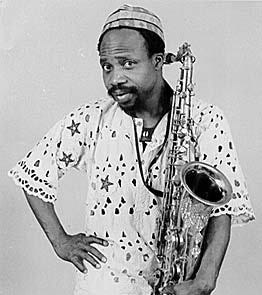It can be easy to think that music from Africa, especially around the period of the ‘60s and ‘70s, begins and ends with the work done by pioneers like Hugh Masakela and Fela Kuti. However, there are musicians from the continent who are just as trailblazing and deeply respected, but to the American/European world are non existent, such is the case of Orlando Julius.
Julius is something of a giant in West African music. His first single “Jaguar Nana” which came out in 1965 was innovative for its fusion of West African Highlife with American Soul and R&B and made him an immediate star in his home country. He was once a band member with Hugh Masakela and had appeared on two of his albums Colonial Man and The Boy’s Doin’ It.
Whereas Kuti in his own words weaponized his monstrously hypnotic and intoxicating grooves as a way to critique the corruption and colonial European influenced thinking and decision making that was widespread in 70s Nigeria, Julius tended to focus on making songs specifically aimed for the dancefloor. However, just because he didn’t explicitly address politics within his songs doesn’t make his music or influence any less remarkable. So how do The Heliocentrics fit into this? On this album Catto and the band have seemingly been able to find the sweet spot of being collaborators and a backing band that with their previous 2 albums just slightly eluded their efforts.
There’s enough experimentation that it keeps the arrangements exciting, but it’s still rooted in this sweaty unshakable groove that doesn’t seem like it will be stopping at any moment. Inspiration Information showed that the band were willing to change and take charge with arrangements, although sometimes it could get in the way of the flow of the songs. Whereas on Lloyd Miller and the Heliocentrics they proved that they were more than able to function as a backing band, although some might feel that it lacks some of their own personal flavour with Miller and his contributions mostly dominating the album.
The 11 minute Be Counted is the best kind of extended slow burning groove that Julius has traded and worked in for all of his career. For my money it’s one of the best songs on the album, at least top 3. The sound of congas gives way to a tricky but hard hitting groove played by Catto that’ll remind listeners of the late great Tony Allen, with a loping bass line that seems to be both locked in step with the drums but carving its own terrain at the same time.
The first song “Buje Buje” is a song Julius did earlier on 1973’s Orlando Julius and the Afro Sounders. The call and response between the horns and Julius’s singing still remain intact, but in this instance the groove feels heavier, sweatier, fine tuned to the point of top condition as a way to draw the listener into its spell.
It’s a similar quality that evidently can be heard in Julius’s saxophone playing, minor key and serpentine rather than charging out over the arrangement in a manner similar to the great Maceo Parker: he chooses to stay within the groove and only pokes out when necessary. Going back to “Be Counted” some listeners may be reminded of Ornette Coleman’s “free funk” music during the ‘70s with albums like Dancing In Your Head and Opening the Caravan of Dreams
All in all, of the 3 albums reviewed thus far this is the best of the bunch. The Heliocentrics stretch their wings and fly far, showing themselves to be composers and musicians without one side upending the other. The album as a whole doesn’t present itself as a crowning achievement, but it really is when you surrender yourself to its groove. Julius Cato and the band built the house and it’s up to the listener to figure out what to do with it. The question some might be wondering is after such an album like this what did their last collaboration effort sound like? If anything it seemed like the band decided to go back to their roots and at the same time make something unlike the other 3 albums that came before it.



